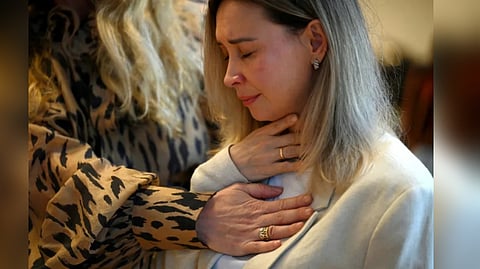

WARSAW: Three years after Russia's invasion, Olga Sheiko still struggles with anxiety—an experience she shares with many Ukrainian women exiled in Poland.
In the first year since fleeing, Sheiko put on 25 kilogrammes, a gain she blames on the mental toll of war. "We've all got used to the stress, but the body's resources are not unlimited," Sheiko, 42, told AFP in Warsaw, her new home.
Even as the war enters a fourth year, Sheiko has never stopped checking the news, fearing for her family and friends in Kyiv, Odesa, and her hometown, Zaporizhzhia. Shelling and destruction have now reached every city in Ukraine "and you don't know what will happen tomorrow."
"These thoughts make it difficult to live here; you can't relax and feel like the Poles. Because we live in anticipation of bad news," she said.
'I ran on anger'
Out of 900,000 Ukrainian refugees now living in Poland, 90 percent are women and children. Their mental health state varies depending on their experience, ability to adapt and where they come from. Many of the exiles remain frazzled and are only starting to realise their condition.
"At the start of the war, acute stress was more intense," said Tetiana Moiseieva, a psychotherapist who holds psychological support workshops in Warsaw. As the war drags on, women are fighting with subdued "accumulated fatigue."
"That's the tricky thing: it's extremely psychologically draining. And this leads to mental problems and diseases," she said.
In the workshops, participants sit in a circle and share their feelings—an exercise that often brings out held-back tears.
Moiseieva said many refugees she deals with turned to antidepressants to cope with the effects of repressed trauma: like Diana Sozonova, a 23-year-old from Kyiv.
She had previously suffered from severe depression. The outbreak of war brought a relapse. "I started having suicidal thoughts," Sozonova told AFP.
She planned on moving back to Ukraine but anxiety stood in the way, triggering an incapacitating fear over the last time she visited the relatively safer Western part of her country. "I felt like a missile could hit me. Right here, right now," she said.
Olga Poliovnycha, 37, fled Kyiv with her three-year-old son. Now settled in a cosy two-bedroom flat, she works remotely for an advertising agency in Ukraine. The journey to stability was tough.
"I ran on anger, but after a year, I couldn't anymore," said Poliovnycha, originally from Kherson in southern Ukraine. "I realised that I had to do something with myself. I have a child who looks up to me."
She said she felt guilt and shame: while people in Ukraine suffered, she was doing better. When the acute stress passed, she slipped into a depressive episode.
"I wanted help, but I had no one to cry to. I was sinking to my child's level. He's crying, and I want to cry too, lie on the floor, and beat my legs. That's when I went to a psychologist."
'Two windows'
Maryna Mazurak, a coordinator at the Ukrainian Women's Club in Warsaw, said "there's always a demand for psychological support" among refugees.
"Almost all the women live in two places at the same time. It's like opening two windows on a computer screen: here is Ukraine, here is Poland, and it's very difficult to connect it all," she said.
Her club hosts activities nearly every day and free spots fill up within minutes of being announced.
"Art therapy, crafts, physical activities -- all aim to help with emotional and psychological self-regulation," Mazurak said.
A group of women who gather each week to weave camouflage nets for Kyiv's army has become particularly close. Last year, the volunteers celebrated Christmas together
For Sheiko, all Ukrainian refugee women have something in common: "We've all experienced loss -- peace, work, family."
She said holidays and exhibition openings once brought meaning to her life, but "they stopped mattering."
"Now, all that matters is having food, staying connected with family, and having a roof over one's head."